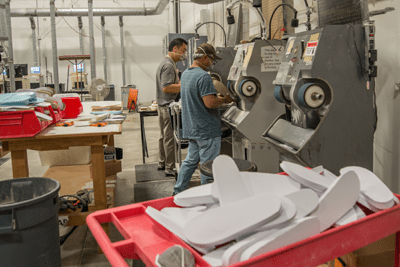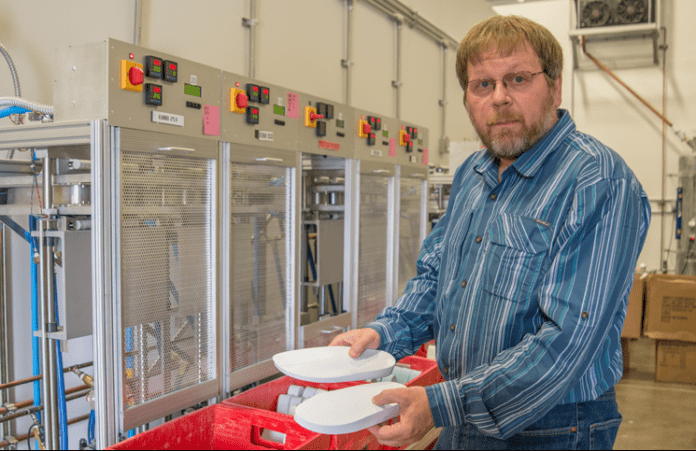Mike Bomar, executive director of the Columbia River Economic Development Council, believes that Clark County is uniquely positioned to have a robust amount of exports to foreign countries. After all, the city of Vancouver has a deep-water port that can ship grains and other commodities; the region has proximity to three airports (Vancouver, Portland and Seattle-Tacoma); and the Union Pacific and BNSF rail lines intersect here.
Make no mistake, the CREDC considers boosting exports a priority for Clark County.
“Certainly, with expanding markets in Asia and the Pacific, there’s a lot of opportunity there for emerging markets and more consumers,” said Bomar.
For businesses looking to seize that opportunity, experts say it’s important to develop an export marketing strategy – one that’s unique compared to the messaging of imported or locally-shipped goods.
 According to associations like the Western United States Agricultural Trade Association (WUSATA), a Vancouver-headquartered association that provides technical assistance to agribusinesses interested in developing business in foreign markets, export messaging should emphasize the safety, reliability and quality of goods produced here, whether those goods are agricultural, manufactured or commercial.
According to associations like the Western United States Agricultural Trade Association (WUSATA), a Vancouver-headquartered association that provides technical assistance to agribusinesses interested in developing business in foreign markets, export messaging should emphasize the safety, reliability and quality of goods produced here, whether those goods are agricultural, manufactured or commercial.
“The U.S. is known for the safety of its products,” said Janet Kenefsky-Henderson, deputy director and international marketing director for WUSATA. “Foreign markets respect [the United States’] inspection processes and our manufacturing guidelines.”
Southwestern Washington, like the rest of the Pacific Northwest, is becoming known for producing high-end artisanal and organic foods, sauces, berries, fruits, vegetables and other agricultural products.
According to Kenefsky-Henderson, touting any labeling or certification those products may have, such as being organic, non-GMO, sustainably-grown, grass-fed and so on, is appealing to foreign markets.
The region is also known for its energy, tech and manufacturing products, which are viewed as safely made and reliable.
The strong reputation the region’s goods possess help maintain a healthy export market, especially if there are recalls in other countries.
“Time and time again, you see different countries coming out with recalls,” said Kenefsky-Henderson. “You see the importation of Western or U.S. goods really go up during that time.”
WUSATA encourages business owners who are interested in exporting their goods to learn as much as they can about the market they’re interested in entering. Learning about a country’s culture and customs and how foreign consumers may view their product helps owners learn which markets to target and how to sell their product.
“It will be different to walk in and sell frozen pizzas” in a country that predominantly eats fresh food, said Kenefsky-Henderson. “It’s going to take a bit of time and effort. It’s all about education.”
Arjen Sundman is the president of Amfit Inc., a company that manufactures the equipment to make orthopedic shoe insoles. Sundman said his company has been “very active” in foreign markets since 2007 and now sells its equipment in more than a dozen countries in Europe, the Middle East, India, Australia, Hong Kong, China and Russia.
“You have to devote the resources on a continuing basis to try to keep [the representatives in those countries] happy,” he said, noting that Amfit attends trade shows throughout the world each year, including in Dubai and Germany.
Sundman said his company’s investment in exporting has “paid off pretty well,” and the representatives Amfit has in foreign countries have developed lucrative distribution channels. He also said that the company’s products fall into a niche market, which keeps demand strong.
Kenefsky-Henderson agreed that communicating well with potential business partners is key, and WUSATA helps train business owners understand cultural customs.
For example, when female business owners travel to the Middle East, Kenefsky-Henderson said it’s important they have their shoulders covered. In some cases, she added, women will wear a head scarf during business meetings.
Business owners who travel to India learn that when a person shakes their head from side to side, it means “yes” – the opposite of what it means in the United States.
“In Asia,” she added, “there are little things, like how to bow [and] when to shake hands, when it’s appropriate.”
Attire is another thing that can impact business deals. In some countries, Kenefsky-Henderson said it’s okay to dress casually, but in Asia “it’s black and blue and business suits.”
A business’s ability to export their goods can have an enormous impact for profits and job retention.
Sundman said Amfit began ramping up exports during the Great Recession. The company was expecting to lose a third of its profit during the first year of the recession, but by increasing the number of countries it was doing business with, Amfit never had to downsize.
“You’re building an annuity for the future,” said Sundman. “These representatives, if they’re successful, they continue generating revenue.”
Like Sundman, Kenefsky-Henderson said that many of WUSATA’s clients are able to successfully diversify their portfolio by touting Pacific Northwest-made goods in foreign countries.
“They (business owners) can look at international markets and develop consumers that aren’t affected” by the local economy, she noted.
In addition to being good for business, Bomar said maintaining a robust amount of exporting aids the regional economy as well.
“Money is coming from outside the economy and adds new dollars in the system that weren’t here previously,” he said. “Those dollars come in and are passed through a coffee shop or other retailers. It helps support the local economy several times over.”



